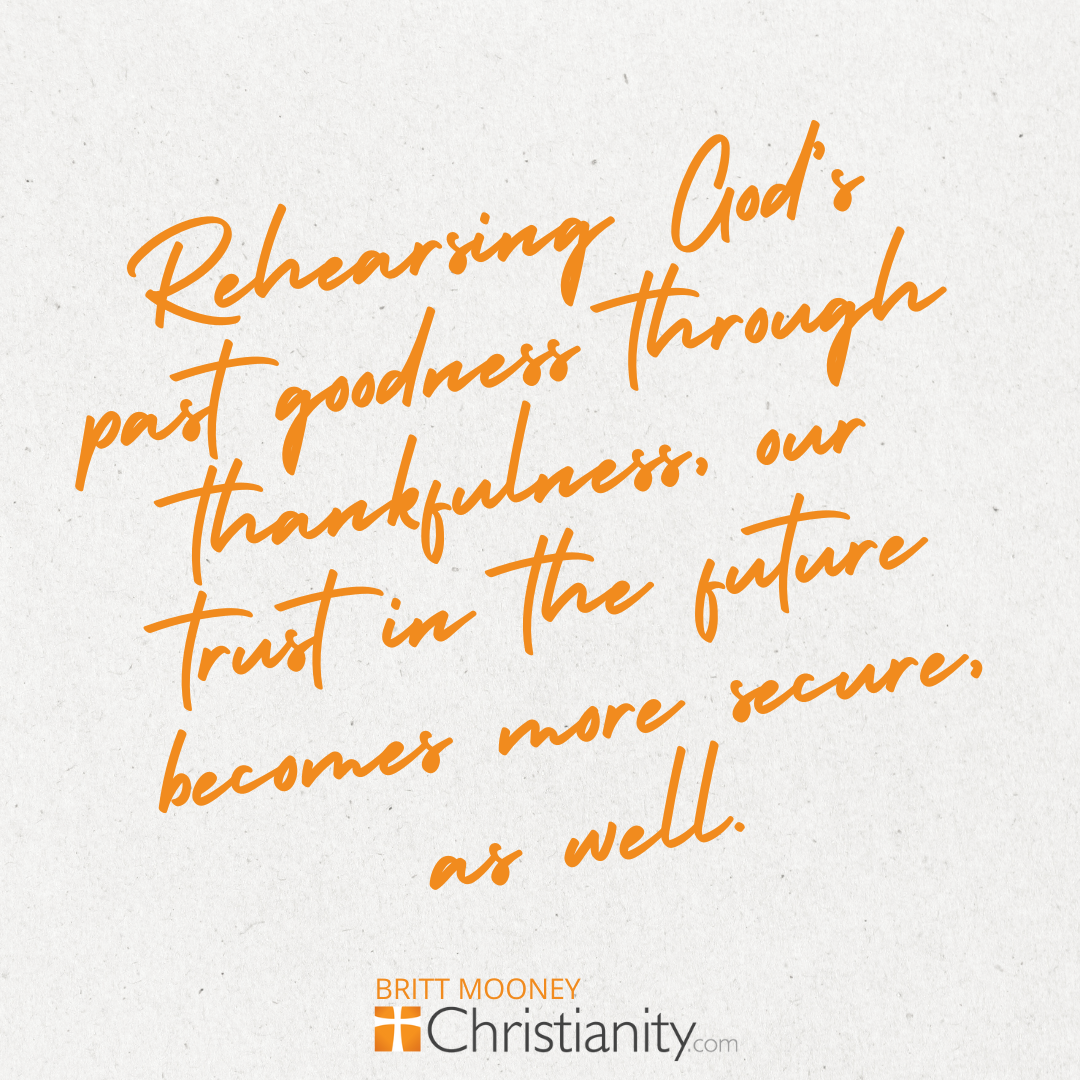We have big family dinners where we prepare our favorite dishes—such as turkey, mashed potatoes, macaroni and cheese, pumpkin pie, and more. The American holiday of Thanksgiving promises connection with loved ones and gaining a few pounds from all the food.
Many families have a tradition during Thanksgiving. Before or after the meal, every person gathered must share one thing for which they are thankful.
Like many holidays, this one day expresses a constant reality. We celebrate thankfulness in November to remind us how we should live the rest of the year in gratitude. Especially as Christians, we shouldn’t limit our thanks to a couple of days a year. Instead, we must find ways to rest in gratitude every day.
What Is Gratitude?
Like many biblical concepts, the scriptural idea of gratitude extends far deeper than simply saying a quick “thanks.” In the Bible, gratitude is a heartfelt and genuine recognition that God is the ultimate source of all good things. Thanksgiving becomes a state of being, an attitude, and a heart of worship. To give thanks to God, we acknowledge blessings and also respond to God’s character, his works, and faithfulness. Our thankfulness leads us to obey and follow the one who alone is good.
The Old Testament Hebrew uses the word todah for gratitude. Related to the root yadah, today means “to praise, confess, give thanks.” Todah expresses the idea of publicly recognizing God’s goodness, usually in the form of praise, worship, and sacrifices of thanksgiving (Leviticus 7:12). For the Old Testament, gratitude wasn’t quiet or private. It comes associated with openly praising God’s covenant and deliverance. A second Hebrew word, barak, means “to bless.” Barak was used to describe both God blessing people and people blessing the Lord (Psalm 103:1-2). Gratitude involves both the heart posture and outward declaration.
For the New Testament, thankfulness is translated from the word eucharisteo, from which we also get the “Eucharist.” Eucharisteo means “to give thanks,” and the Bible uses it when Jesus gives thanks at a meal (Luke 22:19) and when Paul teaches Christians to give thanks in every circumstance (1 Thessalonians 5:18). A related word is charis, which can be translated as “grace.” Still, it also connects the idea of gratitude in response to God’s grace. The apostle Paul often uses charis in conjunction with eucharistia, illustrating how gratitude arises from experiencing God’s gift of grace.
As we take these words and their contexts together, biblical gratitude actively acknowledges God’s goodness and expresses such thanks in words, sacrifice, and obedience. Being thankful to God is more than an emotion. It requires an intentional choice to give thanks in every situation, good or bad, because God’s goodness and promises don’t change. We should live in gratitude as we live in Christ. Thankfulness keeps us humble and faithful. Paul’s letters to the church make gratitude central to the Christian life, encouraging them and us to allow thanksgiving to overflow in prayer, praise, and everyday life (Colossians 3:15-17).
Where Does the Bible Talk about Gratitude?
Both gratitude and ingratitude are addressed in the Bible, and these contrasting themes show us the choice before us.
The Psalms mainly include commands to give thanks. Psalm 100:4 tells us to “enter His gates with thanksgiving, and his courts with praise.” Gratitude is the key to approaching God and engaging with Him intimately. And once we enter his presence, we appropriately respond with thanks to the privilege of being before his throne. Paul writes to the church in Colossians 3:17: “And whatever you do in word or deed, do all in the name of the Lord Jesus, giving thanks to God the Father through Him.” The apostle encourages us to live every moment for Christ, and he identifies part of what it means to “do all in the name of the Lord Jesus”—giving thanks to God. Further, we possess the ability to give thanks to the Father through the work of the Son in us.
Gratitude also results from our redemption. God commanded Israel to remember God’s deliverance from Egypt with songs of thanksgiving (Exodus 15). The feasts of the Old Covenant celebrated and praised God for His promises and works on behalf of His people (Leviticus 23). In the New Testament, gratitude remains centered on God’s salvation, now made possible through the new covenant in the Lord Jesus Christ. We celebrate the gift of salvation with hearts that thank God for grace (2 Corinthians 9:15). Giving thanks becomes an act of worship, helping us continue to be connected with the heavenly reality.
In contrast, the Bible talks about ingratitude as a sin, leading to destruction and emptiness. Romans 1:21 declares how people knew God but “they did not honor Him as God or give thanks to Him, but they became futile in their thinking, and their foolish hearts were darkened.” Ingratitude leads to idolatry, selfishness, confusion, and all kinds of sin and decadence. A sinful heart refuses to recognize God as the source of goodness, as Creator and Provider. God is life, and to reject his authority results in death, spiritual and physical.
The Israelites provide us with an important example of ingratitude as they traveled through the wilderness. God had performed great and wondrous works on their behalf—delivering them from Egyptian slavery, destroying Pharaoh and his army in the Red Sea, meeting with them on Mount Sinai, giving a law to bring life, raining bread from heaven, and more. Despite all this, they often grumbled and complained against God, the opposite of gratitude (Numbers 14). Their lack of thankfulness revealed their unbelief and rebellion, bringing judgment. Ingratitude originates from the heart but can manifest as complaining, entitlement, and mockery.
Gratitude brings us into God’s presence, into his very heavenly courts. Ingratitude produces a hardened heart, pride, and a separation from God. As followers of Jesus, we’re called to choose thankfulness, which brings numerous benefits.

Why Is Gratitude Central to Faith?
Faith is the perception and the pursuit of the unseen, heavenly reality. Through faith, we can see and follow God, having access to his grace. Without faith, it’s impossible to please God. Faith grows when we remember and thank God for his past works. God continually called Israel to remember God’s mighty acts through songs and feasts of thanksgiving. Our thankfulness builds our God-story, a list of how he has provided and delivered us, and how he will do so in the future. Repeating and remembering God’s goodness, we strengthen our faith. Without thankfulness, we develop an evil heart of unbelief.
Rehearsing God’s past goodness through thankfulness, our trust in the future becomes more secure, as well. Giving thanks is part of God’s will for us (1 Thessalonians 5:18). The Father desires to bless us, and gratitude keeps us rooted in him and his benefits. Therefore, God’s will for us includes gratitude in Christ Jesus. Gratitude doesn’t dismiss or ignore hardship. On the contrary, it trusts God’s sovereignty in the trial. Thankfulness during suffering becomes a declaration of trust that God will turn all things for good.
We can even be thankful for what God will do in the future. God’s Word is final, and his promises are sure. So we can speak of gratitude in the assurance of his promises. Romans 5:2-5 connects rejoicing in suffering with a hope that can’t disappoint. Thankfulness gives us the anchor of hope, reminding us of God’s character instead of the storm around us. Thanking God today, we look ahead with confidence to his complete redemption.
With such hope and security, gratitude produces peace. Paul writes in Philippians 4:6-7 that when we share our requests to God “with thanksgiving,” his peace (beyond our understanding) guards our hearts and minds in Jesus. Instead of being ruled by anxiety or fear, we remember that God has been faithful before and will be faithful again. This allows us great peace in uncertain times.
Faith, hope, peace, and trust: these give us the motivation and the strength to endure the hard times. Hebrews 12:28 calls us to be thankful as we receive an unshakable and unstoppable Kingdom. Heaven and earth are being shaken, and the world shakes along with them. Yet we remain steadfast in the eternal Kingdom of God. Thanksgiving lifts our eyes beyond the temporary, changing situations, looking to the unseen and greater hope. Remembering God’s goodness, we dare to persevere with joy.
Finally, walking in God’s presence through thanksgiving, we fall more deeply in love with Him. We are content and satisfied in his presence. As we recall his mercy, faithfulness, and giving, our affection and appreciation deepen. Psalm 136 repeats the line, “His steadfast love endures forever.” God’s love never fails, and our hearts respond with love in return.
How Do We Practice Gratitude All Year?
As we understand, gratitude is a state of mind, heart, and living; it sounds good. But how do we choose it every day and moment? While gratitude isn’t (and can’t be) limited to one holiday in the year, Thanksgiving day provides traditions that can guide us into a lifestyle of gratitude year-round.
At Thanksgiving, families often pause to remember what they’re thankful for. This simple act can be powerful and expresses a biblical theme. “Bless the Lord, O my soul, and forget not all His benefits.” (Psalm 103:2) We can live this out by keeping a journal, writing down ways God has remained faithful and answers to prayer, allowing us to return to it for reminders. We should also speak thanks aloud in private and corporate prayer. Additionally, we should express gratitude to God in our conversations with others.
At Thanksgiving, we gather with loved ones around a shared meal, reflecting the feasts of the Old Testament. We can do this more often in our own lives. Gratitude grows in community. Meeting regularly with our earthly and spiritual families to pray, worship, and give thanks reinforces gratitude. We can be intentional about having people share testimonies of faith and miracles, encouraging every heart with joy.
Thanksgiving brings several opportunities to serve food to the hungry or give to those in need. Our culture connects the holiday of thanks to charity and giving. This reveals a profound truth: gratitude naturally flows into generosity. Remembering God as the giver of every good gift, we find joy in sharing, especially with those in need. We take on God’s character of love and compassion. Therefore, we shouldn’t limit generosity to a couple of weeks a year, but instead practice it throughout the year by volunteering to offer our time and resources.
Build gratitude into daily habits. Start the morning by thanking God for his new mercies (Lamentations 3:22-23). End the day by thinking of three blessings of the day. Write down verses on thanksgiving and post them in places where you can continually see them. Resists complaining. Biblical gratitude is a discipline, so consistent practice renews the mind and transforms the life.
Living in gratitude honors God, strengthens our faith, and brings joy to our lives.
Photo Credit: ©GettyImages/DjelicS





.jpg)